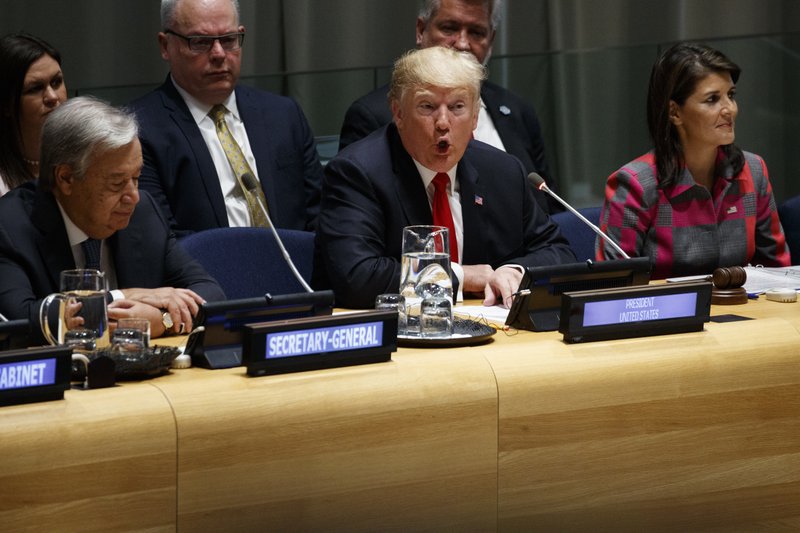UNITED NATIONS -- President Donald Trump raised hopes at the United Nations on Monday that a second meeting with North Korea's Kim Jong Un could occur "quite soon," expressing optimism that his efforts to negotiate a denuclearization deal are still on track.
The conciliatory tone came one year after he used his debut at the U.N. to deride the autocrat as "Little Rocket Man" and threaten to "totally destroy North Korea" if the U.S. were forced to defend itself or allies.
Trump praised Kim as "very open" and "terrific," despite the glacial pace of progress toward denuclearization on the Korean Peninsula.
Trump told reporters that the talks are "moving very well" and that the two sides are making "tremendous progress," even though he had abruptly canceled a visit from Secretary of State Mike Pompeo to Pyongyang earlier this month.
U.S. intelligence agencies have said that North Korea, which has not tested a ballistic missile since agreeing to the summit months ago, continues to work on technical advancements in its nuclear arsenal in secret.
But the tone has warmed again since Kim met last week with South Korean President Moon Jae-in, who made his first visit to Pyongyang. Moon said Kim pledged to work toward denuclearization by 2021, which would mark the end of Trump's first term.
"We have many things in store," Trump said. He noted Kim had sent him a letter requesting a second meeting. "We'll be doing that," he said.
U.S. officials defended Trump's strategy of engagement with the erstwhile pariah state as the president embarked on a week of meetings with world leaders. The softer tone toward North Korea -- once threatened with "fire and fury" -- has been replaced by rosy optimism, with Trump reserving tough rhetoric for another potential nuclear aspirant and strategic foe: Iran.
"It was a different world," Trump said Monday of his one-time moniker for the North Korean leader. "That was a dangerous time. This is one year later, a much different time."
Trump began his second visit to the U.N. with a brief meeting on the global drug trade before sitting down with Moon. Some 130 U.N. member states signed a U.S.-sponsored declaration to step up action against the narcotics trade that has left 31 million people around the world requiring treatment and is causing 450,000 deaths every year from overdoses or drug-related health issues.
At their meeting, Moon delivered a personal message to Trump from Kim.
"You are the only person who can solve this problem," Moon said to Trump, relaying Kim's words.
Trump, for his part, said: "We are in no rush. We are in no hurry" to bring about a nuclear agreement. U.S. officials are insisting that economic sanctions remain in place against the North until it eliminates its nuclear program.
Trump said Pompeo has been tasked with bringing about the second summit, despite an assessment by U.S. officials that the North has not followed through on its commitments to take steps toward denuclearization. Pompeo defended Trump's decision to seek another meeting despite the slow progress.
"We've been at this the other way an awfully long time and failed," he said.
"We're bringing the two senior leaders, the individuals who can actually make the decisions that will move this process forward," in hopes they can make a breakthrough, he said.
Trump and Moon on Monday were signing a new version of the U.S.-South Korean trade agreement, marking one of Trump's first successes in his effort to renegotiate economic deals on more favorable terms for the U.S. Even so, some U.S. officials worry that South Korea's eagerness to restore relations with the North -- known as its "sunshine policy" -- could reduce sanctions pressure on Kim's government, hampering efforts to negotiate a nuclear accord.
The nuclear threat also was on the agenda at Trump's first meeting in New York, a dinner with Japanese Prime Minister Shinzo Abe on Sunday night.
Trump is set to address the U.N. General Assembly this morning and will chair a meeting of the Security Council on Wednesday on counter-proliferation.
Trump earlier this year bucked allies and removed the U.S. from the 2015 Iran nuclear deal, citing Iran's malign influence in the region and support for terrorist groups like Hezbollah. The next round of tough sanctions on Iran is set to go into effect in November.
Iranian President Hassan Rouhani is in New York to attend U.N. meetings. U.S. officials said Trump is not seeking a meeting with the Iranian leader, but is not opposed to talking if Iran requests a session.
Rouhani, appearing on NBC on Monday, cited the threat of more U.S. sanctions in stating, "There is no such program for a meeting."
Also on Monday, a statue of Nelson Mandela, who led South Africa's transition from the apartheid system of white minority rule over the majority black population, was unveiled, and delegates addressed a "peace summit" to elevate his memory in this year's centennial of his birth.
"Few people in the history of our world have left such an incredible mark on humanity," U.N. General Assembly President Maria Fernanda Espinosa Garces said at the dedication ceremony of the life-sized sculpture of the prisoner-turned-president.
Dozens of leaders from both rich and poor nations took turns to hail the legacy of Mandela who, after his release from nearly three decades in prison, became South Africa's first black president in its first multiracial elections in 1994.
Information for this article was contributed by Jonathan Lemire, Zeke Miller, Matthew Pennington, Edith M. Lederer, Jennifer Peltz and Angela Charlton of The Associated Press; and by David Nakamura of The Washington Post.
A Section on 09/25/2018

